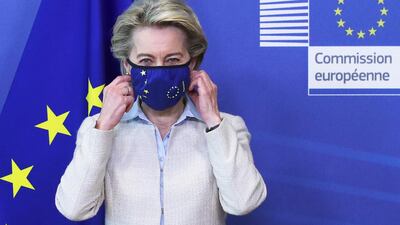European leaders said they were ready to join talks with the US on lifting intellectual property rights on Covid vaccines after Joe Biden said the move could help bring the pandemic under control.
European Commission President Ursula von der Leyen said Brussels was committed to bold gestures to end the crisis after Mr Biden's announcement that he would support waiving intellectual property rights for COVID-19 vaccination.
The World Health Organisation said in April that of 700 million vaccines administered around the world, only 0.2% had been in low-income countries. A recent surge of infections in India, the world's second most populous country, has underlined the point.
WHO chief Tedros Adhanom Ghebreyesus reached for capital letters in a tweet calling Biden's move a "MONUMENTAL MOMENT IN THE FIGHT AGAINST #COVID19", and said it reflected "the wisdom and moral leadership of the United States".
French President Emmanuel Macron on Thursday said he was "absolutely in favour" of a waiver. Ms von der Leyen has defended the EU from charges that it has hoarded supplies that could have benefitted hard hit developing nations.
"The European Union is ready to discuss any proposal that addresses the crisis in an effective and pragmatic manner," she told the European University Institute in Florence.
"That's why we are ready to discuss how the US proposal for a waiver on intellectual property protection for covered vaccines could help achieve that objective."
Mr Biden's decision to drop US opposition to freeing up vaccine rights was hailed across the developing world where the pandemic is intensifying. “[This is] a remarkable expression of leadership,” said Africa Centres for Disease Control & Prevention Director John Nkengasong. “My message is an appeal to the international community, to our partners, to please be on the right side of history because history will remember this.”
Pharmaceutical makers are lobbying hard against the proposal, which would use emergency provisions built into international trade rules. Shares in major vaccines producers Pfizer, Moderna, Novavax and BioNTech were down by as much as 10 per cent on Thursday. Even so companies that step forward to manufacture the vaccines would face barriers to entry.
"The production of mRNA vaccines is not just about intellectual property," said Zhiqiang Shu, senior biotechnology analyst at Berenberg said. "A lot of other things are in play, such as manufacturing know-how and capacity. Other companies or countries are unlikely to produce mRNA shots quickly."
Ms von der Leyen also defended the EU's vaccination policy, criticised for its sluggishness. Brussels is in charge of procuring vaccines and distributing them to its 27 member states.
“It is clear that our European vaccination campaign is a success,” she said.
“What counts is the steadily increasing, daily delivery of vaccines to our people – and to the world.”
Ms von der Leyen said 30 Europeans were receiving a shot every second and that the EU had exported more than 200 million doses to the world.
“Some might say that countries like the US and the UK have been faster at the beginning,” Ms von der Leyen said. “But I say: Europe achieved this success while remaining open to the world. While others keep their vaccine production for themselves, Europe is the main exporter of vaccines worldwide.”
Last month, the WHO said that of the 700 million vaccines administered across the globe, only 0.2 per cent had been given in low-income countries.










